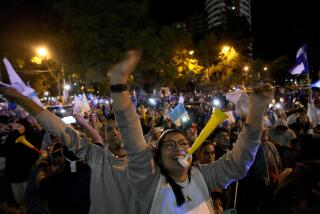Reagan Sees Hope Despite Philippine Election Strife : Hails Signs of ‘2-Party System’
- Share via
WASHINGTON — President Reagan, sidestepping judgment on reports of widespread fraud in the Philippine election, said today that the voting is “evidence of a strong two-party system” and voiced hope that the two sides “can come together to make sure the government works.”
Speaking to out-of-town journalists as a team of U.S. observers flew home with allegations of abuse, Reagan said there is reason for concern but insisted that the Philippine people themselves must determine the fairness of the election.
“I think what we have to watch for is that, in spite of all these charges, there is at the same time evidence of a strong two-party system now in the islands,” Reagan said.
“We want to help in any way we can,” the President added, in ensuring “that once the election is over, that the results of the election can go forward and that the two parties can come together to make sure the government works and that we can retain the historic relationship we’ve had with the Philippine people and the Philippine islands.”
Earlier, White House spokesman Larry Speakes, in the Administration’s first comment on the election, expressed concern about reported electoral fraud but stressed that “the outcome of the election is not clear and the facts are not in.”
Marcos Victory Seen
With President Ferdinand E. Marcos and challenger Corazon Aquino both claiming victory based on incomplete, unofficial tabulations, the Administration is known to expect a Marcos victory.
It indicated that Marcos must somehow accommodate the Aquino-led opposition with political, economic and military reforms. Despite the charges of fraud, echoed by a team of U.S. observers led by Sen. Richard G. Lugar (R-Ind.), Speakes also said the Administration is gratified that “both candidates received significant popular support from millions of Filipinos.”
“There is obvious enthusiasm for the electoral process on the part of the Filipino citizens,” Speakes said, “and the basis exists for a strong two-party system.”
With Lugar scheduled to report to Reagan on Tuesday morning and the Administration apparently determined to offer no public judgment on the fairness of the election, Speakes added, “When the results are complete, both parties should work to form a viable government without violence and work to implement reforms in political, economic and military areas.”
Above all, Speakes said, “we need and hope and urge a peaceful reaction to the election.”
Not Suggesting Coalition
Speakes said he was not suggesting that the election should result in formation of a coalition government. When pressed on whether his statement tacitly conferred legitimacy on the results of the election, Speakes replied, “The Filipino people will determine if they are legitimate.”
“The main thing,” one Administration official said, “is that we have a strong and stable Filipino ally in the Pacific for the United States. And a strong government is essential to maintain a peaceful resolution of the problems that face the Philippines.”
The Administration statements were intended not only as a signal to Marcos, who has been under strong U.S. pressure to implement political reforms, but also as a message to Aquino, who had threatened protests in the event of a stolen election.
“The thrust of our statement,” the official explained, “is not to have violence, not to have demonstrations in the streets just because you didn’t like the election: Get on the team and work to form a government.”
More to Read
Sign up for Essential California
The most important California stories and recommendations in your inbox every morning.
You may occasionally receive promotional content from the Los Angeles Times.










